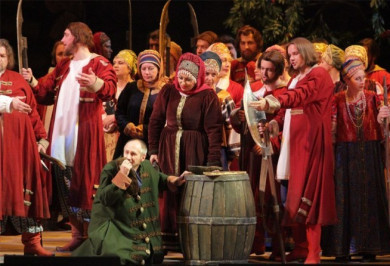Mariinsky II (New Theatre)
| 29 July |
| 18:00 |
| 2023 | Saturday |
|
Conducted by Maestro Gergiev Khovanshchina Opera in 5 acts
|
|
| Artists |
Credits |
Conductor Revival Stage Director Opera company
|
Performed in Russian, with synchronised English supertitles World premiere: 21 Feb 1886 Mariinsky Theatre, St Petersburg, Russia Premiere of this production: 01 May 2000 The performance has 2 intermissions Running time: 4 hours 40 minutes
New stage version: Yury Alexandrov (2000)
Libretto by the composer
Orchestrated: Dmitry Shostakovich
Stage Director - Leonid Baratov
Set Designer - Fedor Fedorovsky Khovanshchina (Hovanscina, sometimes rendered The Khovansky Affair) is an opera (subtitled a ’national music drama’) in five acts by Modest Mussorgsky. The work was written between 1872 and 1880 in St. Petersburg, Russia. The composer wrote the libretto based on historical sources.
Ever since Musorgsky, as he himself declared, “filled in a jotter and called it Khovanshchina” (1872) the opera has been met with both good and bad luck. Musorgsky almost completed the piano score, omitting only a small fragment in the final scene of self-immolation. After the composer’s death the opera was completed and instrumented by Rimsky-Korsakov.
The path to international acclaim was very roundabout: most of Khovanshchina – repeating the fate of Boris Godunov – was performed in the version produced by Rimsky-Korsakov. While paying their respects to this version, starting in the 1950s musicians began to express their preference for the composer’s original score, lovingly restored by Pavel Lamm (1932) and the orchestral score of Dmitry Shostakovich (1959), the closest to Musorgsky’s original idea. In its day the Kirov Theatre was the first to turn to Shostakovich’s version (1960). In December 1988 with the arrival of Valery Gergiev as the theatre’s Artistic Director this production was revived. That was Gergiev’s first major artistic production in his new role.
And twenty-five years after the revival we are again – to use an expression of Musorgsky – “swimming in the waters of Khovanshchina”. Even over such a lengthy period the production has never changed – in terms of the music or the décor. Perhaps this is all due to the magnificent stage direction of Leonid Baratov (1952), an outstanding master of the stage who worked with the USSR’s greatest musical theatres.
The attention to realistic details and the scale of the crowd scenes gave his productions historic veracity and monumentality. Baratov’s Khovanshchina survived Rimsky-Korsakov’s version and the score by Shostakovich (Baratov himself then made minor amendments in terms of the production). For the Musorgsky Festival in 1989 the production was edited by stage director Emil Pasynkov, while Valery Gergiev refreshed musical perceptions, restoring the music that had been unjustifiably cut. The fabled sets by Fyodor Fedorovsky were also restored, continuing in the Soviet era the traditions of the great theatre designers Konstantin Korovin and Alexander Golovin. That stage version was subsequently revived by Yuri Alexandrov and Yuri Laptev (2000).
The Mariinsky Theatre’s repertoire retains the production dating back to the premiere of Khovanshchina at the Mariinsky in November 1911 (Stage Director and performer of the role of Dosifei – Fyodor Chaliapin; Conductor - Albert Coates; Designer – Konstantin Korovin).
It is pleasing that Khovanshchina, although not yet having achieved the same public acclaim as, say, The Queen of Spades or Eugene Onegin, is becoming a favourite of prima donnas and principals.
Yet another – almost the most important – “character” in the opera is the orchestra which sings, at times ideally intoning the vocal parts, the orchestra which towers over the plot of the introduction in Dawn over the River Moskva and the gloomy Golitsyn Train... “For me the sound of the orchestra in the final scene is much more important than all the props on-stage. Is it so very important if the schismatic monastery is on fire or not? I believe that here it is the orchestra that has to be on fire.” These words of Gergiev convey the atmosphere of creative fire that accompanies Khovanshchina at the Mariinsky Theatre.
Today the composer could say with more justification than ever “Today I live in Khovanshchina as I once lived in Boris and I’m still the same Musorgsky...” It’s an opera about age-old Russian sedition, current at all times.
Iosif Raiskin Additional information Characters |
|
 Mariinsky Theatre:
Mariinsky Theatre:  Mariinsky-2 (New Theatre):
Mariinsky-2 (New Theatre):  Mariinsky Concert Hall:
Mariinsky Concert Hall: 

